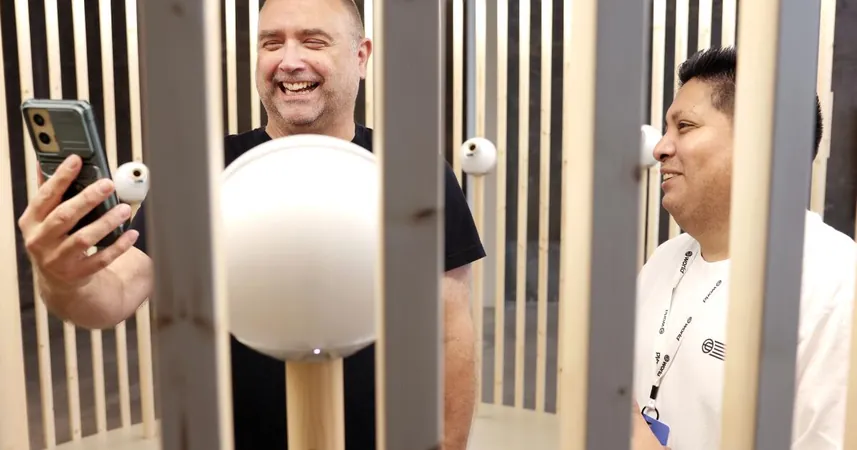
Sam Altman's Eye-Scanning Orbs: Are They the Future or a Privacy Nightmare?
2025-05-12
Author: Ling
A groundbreaking store has just opened in downtown San Francisco’s Union Square, captivating a crowd with its futuristic offerings. The shop, adorned with a cryptic message, invites passersby to engage with technology that could redefine how we verify our identities in the ever-evolving digital landscape.
The Orb Experience: What’s It All About?
Curious visitors gather outside, taking turns to peer into white devices known as 'orbs.' By scanning their irises, they can prove their humanity and receive a free verified World ID—an ID linked to online services, along with bonus Worldcoin cryptocurrency tokens.
But not everyone is ready to jump on this bandwagon. A cautious onlooker, 66-year-old Brian Klein, expressed his reservations. “I don’t want that thing taking any of my data,” he remarked, highlighting the fears many have about biometric scanning.
Created for the Age of AI
The technology behind these orbs isn’t just a fantastical dream; it’s a brainchild of Tools for Humanity, a startup founded by Alex Blania and Sam Altman, the entrepreneur known for OpenAI’s ChatGPT. Altman emphasizes that in a world filled with AI-generated content, maintaining the authenticity of human identity is paramount.
World ID: A Controversial Approach to Verification
The World app provides an intriguing draw: users can verify their identity without relinquishing personal details. No names or emails required. But skepticism looms regarding the safety of biometric data. Privacy advocate Justin Kloczko warns, “Once your retina scan is out there, you can't get a new set of eyeballs.” Concerns mounted when data breaches at companies like 23andMe came to light, fueling fears about potential misuse.
Going Global: The Expansion of World
Despite these concerns, World is making waves internationally, with over 12 million users verified across continents. The company aims to expand into the U.S. by deploying 7,500 orbs in major cities, including Los Angeles, Atlanta, and Miami. Users can claim up to 39 Worldcoin tokens for their participation.
Backing and Regulatory Scrutiny
With significant investments from well-known venture capital firms and a whopping $240 million raised, Tools for Humanity is poised for growth. However, regulators in various countries have raised red flags over data privacy, reminiscent of whistleblower Edward Snowden’s cautionary remarks regarding biometric data.
Innovation Meets Hesitation
At the launch event in San Francisco, tech enthusiasts mingled with local dignitaries, but not all are on board. Critics like Ashkan Soltani highlight potential privacy pitfalls where biometric data could be misused. Currently, multiple online services use a range of verification methods, leading some to wonder if a standardized proof of humanity is worth the risks.
The Consumer Perspective: Mixed Reactions
Among the curious attendees, Zachary Sussman, drawn to the 'Black Mirror' aesthetic, wasn't deterred by privacy concerns. Others focused on practicality. Developer Doug Colaizzo expressed support for finding better methods of identification, even if this initiative isn’t the final solution.
Challenges Ahead: Will the Orbs Catch On?
Despite the excitement surrounding these eye-scanning orbs, industry experts warn that requiring physical visits for scans could hinder widespread adoption. Plans for a portable “mini Orb” could pave the way, but consumer skepticism—like that of Brian Klein—remains a significant barrier.
Final Thoughts: The Futuristic Dilemma
As the line between technology and privacy continues to blur, the world watches to see if Altman’s vision of a verified humanity can thrive amid growing concerns about data security. Will these orbs become a lifeline for secure online interactions, or will caution prevail in the age of AI?


 Brasil (PT)
Brasil (PT)
 Canada (EN)
Canada (EN)
 Chile (ES)
Chile (ES)
 Česko (CS)
Česko (CS)
 대한민국 (KO)
대한민국 (KO)
 España (ES)
España (ES)
 France (FR)
France (FR)
 Hong Kong (EN)
Hong Kong (EN)
 Italia (IT)
Italia (IT)
 日本 (JA)
日本 (JA)
 Magyarország (HU)
Magyarország (HU)
 Norge (NO)
Norge (NO)
 Polska (PL)
Polska (PL)
 Schweiz (DE)
Schweiz (DE)
 Singapore (EN)
Singapore (EN)
 Sverige (SV)
Sverige (SV)
 Suomi (FI)
Suomi (FI)
 Türkiye (TR)
Türkiye (TR)
 الإمارات العربية المتحدة (AR)
الإمارات العربية المتحدة (AR)